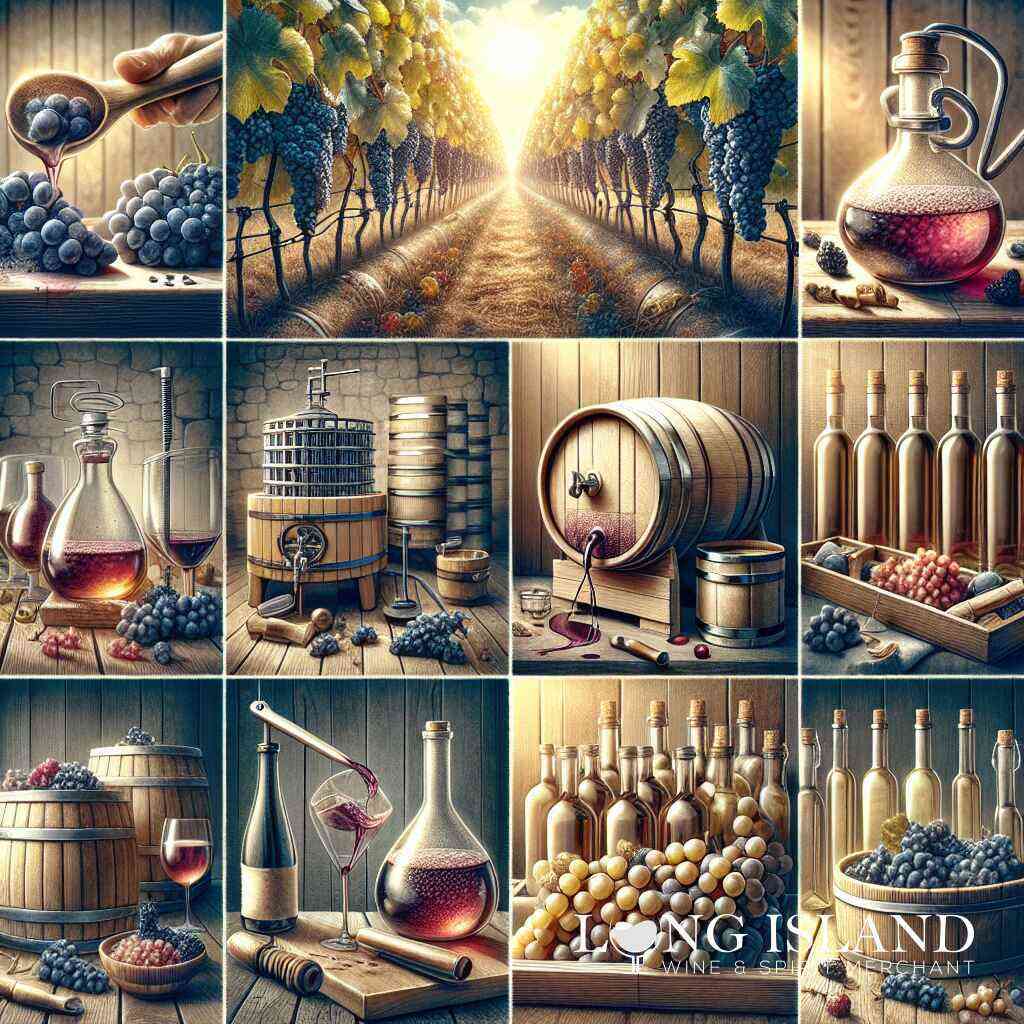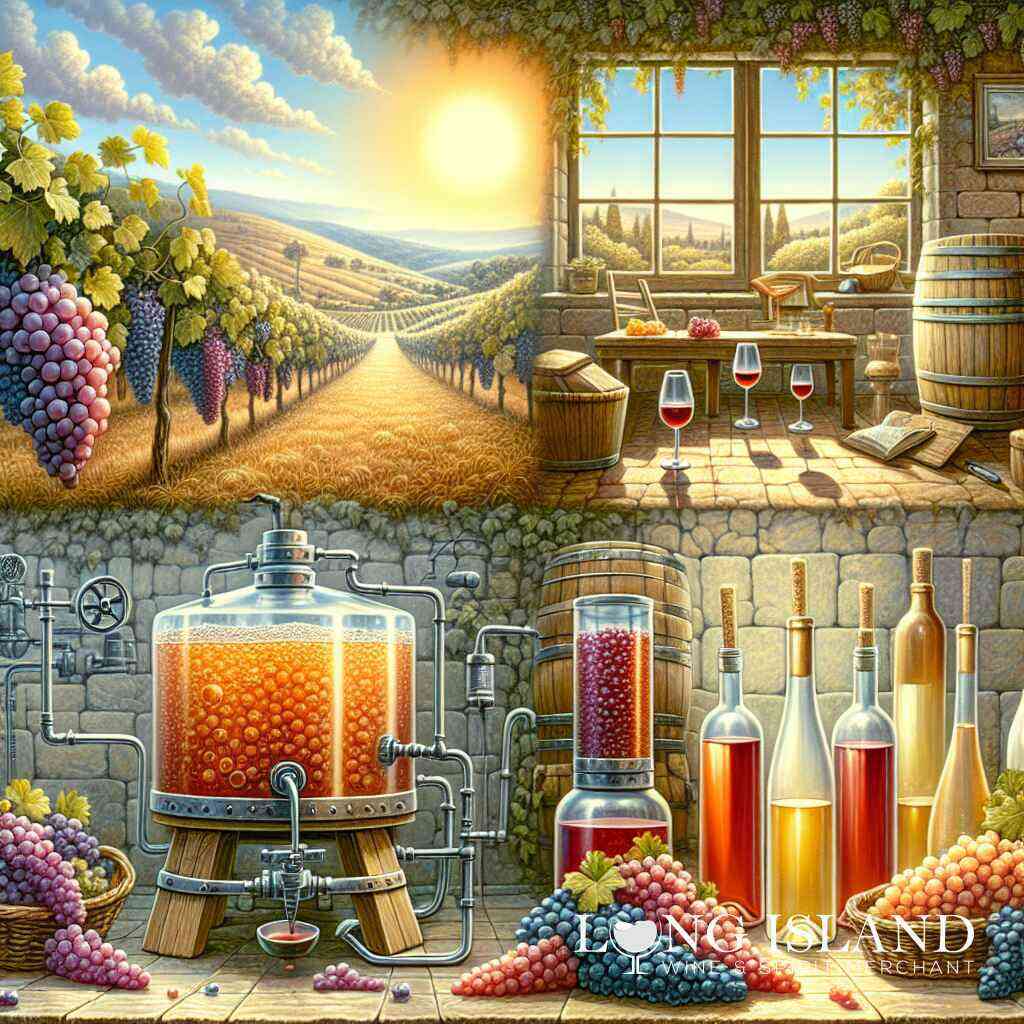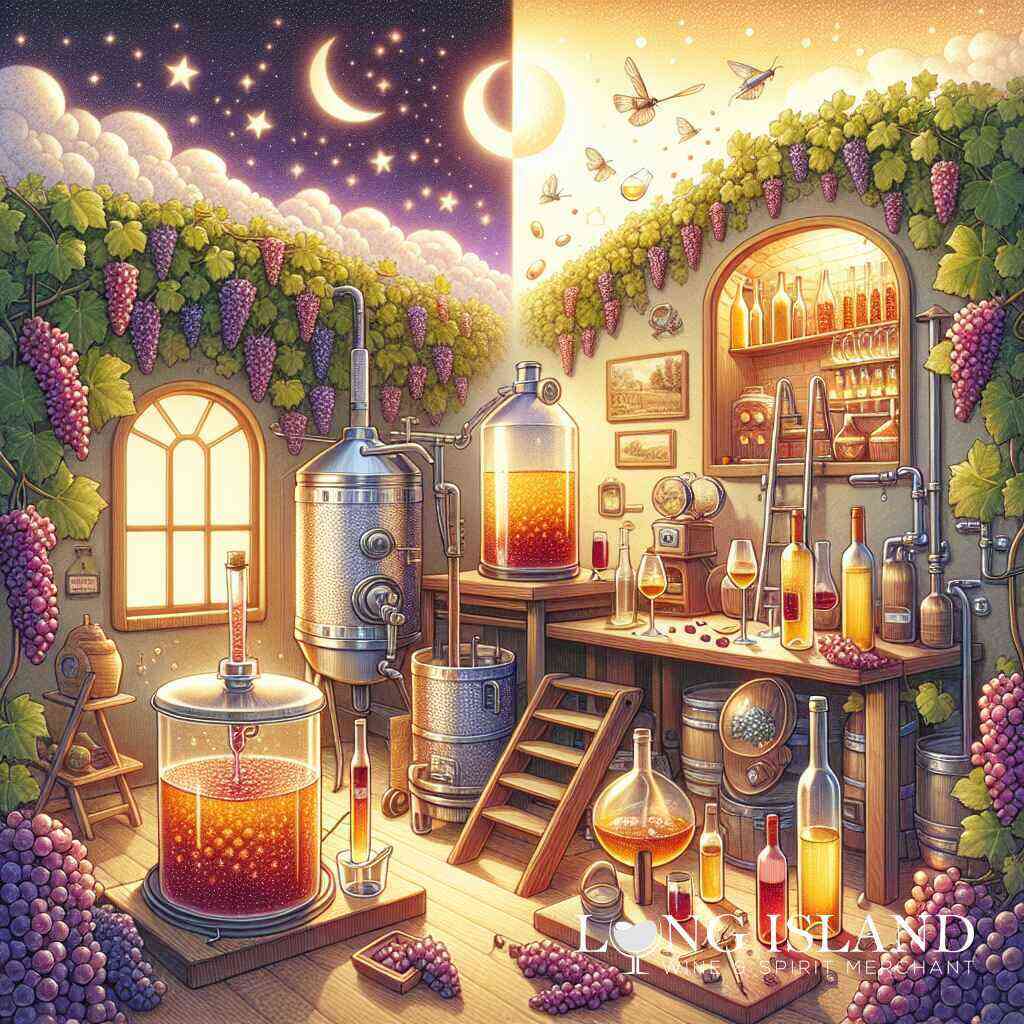
Wine Making Guide for Beginners: How to Make Wine
May 16, 2024
Embarking on Your Wine-Making Journey
Understanding the Basics of Wine Making
The journey into wine-making begins with grasping the fundamentals, an exciting endeavor that transforms simple grapes into exquisite wine. At its heart, wine-making is an art, honed over centuries, yet it is also accessible for beginners willing to learn. The basics of crafting wine at home involve understanding the process from grape selection to bottling, each step pivotal in creating a delightful bottle of wine. This guide aims to demystify the wine-making process, ensuring that even novices can approach it with confidence. Wine crafting at home is not just about following a recipe, it’s about engaging with every element of the process, from the type of grape to the moment of tasting.
Selecting the Perfect Grapes for Your Wine
Choosing the right grapes is fundamental to the wine-making process. Different varieties can dramatically alter the flavor, aroma, and character of your wine. Grapes can be sourced from local vineyards, specialized growers, or even homegrown, provided the conditions are right. The key is to select fresh, high-quality grapes, as the quality of your input directly affects the output. Whether aiming for a robust red or a refreshing white, the choosing grapes for homemade wine step is where your wine’s journey truly begins. Understanding grape varieties and their characteristics can turn a good wine into an exceptional one.
The Role of Sugar in Wine Making
Sugar plays a crucial role in winemaking, serving as the fuel for fermentation. The type and amount of sugar in the grape juice will dictate not only the alcohol content but also influence the wine’s taste. In some cases, winemakers might add sugar to adjust the wine’s balance or to ensure complete fermentation. The sugar importance in crafting wine cannot be overstated, it is a delicate balance where a little too much or too little can significantly alter the wine’s profile. Understanding how sugar levels affect fermentation and the wine’s final taste is essential for crafting a wine that truly satisfies.
Introduction to Wine Yeast and Fermentation
Yeast is another critical component in winemaking, responsible for converting the sugars in grape juice into alcohol through the process of fermentation. Selecting the right strain of wine yeast is vital, as it not only affects the wine’s alcohol content but also contributes to its flavors and aromas. An introduction to fermentation yeast in winemaking reveals the diversity of available yeasts, each suitable for different types of wine. The fermentation process itself requires careful temperature control and monitoring, as the yeast’s activity can be influenced by environmental factors, leading to variations in the wine’s development.
Choosing the Right Wine-Making Equipment
Last but not least, having the right equipment is essential for successful wine-making at home. Basic equipment includes fermenters, pressers, bottles, corks, and the various tools needed for measuring and testing the wine throughout its development. While it might seem daunting at first, each piece of equipment serves a specific purpose in the wine-crafting process. By selecting equipment for DIY wine, beginners can ensure a smoother wine-making experience, minimizing errors and maximizing the potential for a delicious final product. Proper equipment not only facilitates the wine-making process but also enhances the winemaker’s ability to experiment and refine their craft over time.

The Wine-Making Process Unveiled
Sanitizing Your Wine-Making Equipment
Before diving into the enchanting world of winemaking, it’s imperative to emphasize the importance of cleanliness and sanitation. Every piece of equipment, from fermenters to bottles, needs to be thoroughly sanitized to prevent contamination and ensure the quality of your wine. This step is as crucial as selecting the right grapes or yeast for your wine. Using sanitizing gear for wine crafting can make this process efficient and effective, protecting your wine from unwanted bacteria and wild yeasts that could alter its flavor and spoil your hard work. Remember, a clean start is the key to a successful wine-making journey.
The Steps of Fermentation for Beginners
Fermentation is a magical phase where grapes transform into wine. Understanding the steps of fermentation for beginners is essential. This process begins with crushing the grapes to release their juice, which is then mixed with yeast to kickstart fermentation. The yeast feeds on the sugars in the grape juice, producing alcohol and carbon dioxide in the process. Temperature control is critical during this phase, as too high or too low temperatures can stall fermentation or kill the yeast. Monitoring the progression of fermentation allows you to make adjustments as needed, ensuring a smooth transition to the next stage of wine-making.
DIY Wine: Crafting Your First Batch
Crafting your first batch of DIY wine is an exciting venture into the world of home wine-making. Armed with clean equipment and a basic understanding of fermentation, you’re ready to embark on this creative journey. Choosing a simple recipe for your first attempt can help demystify the process and increase your chances of success. Patience and attention to detail during this phase will reward you with a wine that reflects your personal touch. Visit a local Long Island wine and spirit merchant for a wine-tasting event near you, and don’t hesitate to ask for recommendations on pairing options to further expand your palate and complement your home-crafted wines. Remember, making wine at home allows you the freedom to experiment with different grape varieties, yeasts, and techniques, gradually refining your skills with each batch.
Aging Your Wine: Patience Pays Off
The aging process is where your wine develops its complex flavors and aromas, transforming from a simple grape juice into a fine wine. Patience truly pays off during this phase. For insights into how aging and other factors contribute to the wine’s development, check out the Ultimate Guide to Selecting White Wine on Long Island. Whether you choose to age your wine in bottles or barrels, the key is to provide a stable environment that fosters the wine’s maturation. Understanding how different aging environments and durations affect your wine’s flavor profile can be enriched by exploring 2024’s Best Marsala Wine Selections Near You. Exploring the homemade wine aging process can offer insights into how different aging environments and durations affect your wine’s flavor profile. This stage of wine-making is both an art and a science, allowing you to witness the remarkable transformation of your wine over time.
Bottling Wine: The Final Step
Bottling is the final step in the wine-making process, signifying that your patience and hard work are about to be rewarded. This phase requires precision and care, as improperly sealed bottles can lead to oxidation or spoilage. Using the right bottling of your homemade wine equipment ensures that your wine is preserved perfectly, and ready to be enjoyed at the right moment. Personalized labels or custom engraving can add a charming touch to your bottles, making them not only a testament to your winemaking skills but also a beautiful reflection of your brand or a thoughtful gift for friends and family. Remember, each bottle of wine you create is a story of your journey into the fascinating world of winemaking.
Beyond the Basics: Enhancing Your Wine-Making Skills
Exploring Different Types of Wine: Red, White, and Rose
When you’re ready to expand beyond the basics of winemaking, consider delving into the diverse world of wine types. Whether it’s the robust notes of red wine in Long Island, the crisp freshness of white wine, or the delicate balance of a rosé, each type offers unique challenges and rewards in the wine crafting process. Understanding the nuances of red, white, and rose wines is crucial, as each requires different grapes, fermentation techniques, and aging processes. For instance, red wines often benefit from aging and complex fermentation procedures to enhance their depth and richness, while white and rose wines might highlight the grape’s natural flavors, requiring careful handling to preserve their delicate aromas and tastes. Explore these different wine styles to truly embrace the multifaceted nature of winemaking, turning your home into a personal Long Island wine store full of variety.
Advanced Techniques: Wine Blending and Tasting Notes
As you grow more comfortable with making wine, exploring advanced techniques such as blending and the development of tasting notes can significantly enhance your craft. Blending involves combining different types of wines to achieve a particular flavor profile or balance, requiring a keen sense of taste and a deep understanding of each wine’s characteristics. Mastering techniques for blending wine at home can elevate your homemade wine, creating complex, nuanced flavors that embody your winemaking style. Furthermore, developing tasting notes for each batch allows you to track your progression, understand your preferences, and refine your practices. This skill enriches the wine-making experience, turning each bottle into a lesson and a celebration of your evolving talents.
Utilizing Wine-Making Kits and Accessories
For those looking to streamline the winemaking process or diversify their wine portfolio, utilizing wine-making kits and accessories can be a game-changer. Our kits often come with pre-selected grapes and yeasts, perfect for crafting your wine at home, available at Long Island Wine & Spirit Merchant. These kits often come with pre-selected grapes, yeasts, and sometimes even flavor additives, offering a simplified route to crafting wine at home. Additionally, the right accessories, from specialized fermenters to precise measuring tools, can enhance the precision and enjoyment of your winemaking endeavor. They not only make the process more manageable but also help in achieving consistently high-quality results. Investing in quality kits and accessories from a reputable Long Island wine and spirits merchant can significantly impact your wine crafting journey, allowing for exploration and experimentation with less risk.
Storing Your Homemade Wine: Tips and Tricks
One of the most critical aspects of winemaking that often gets overlooked by beginners is the proper storage of their creations. The way you store your wine can drastically affect its aging process, taste, and longevity. From choosing the right environment to understanding the importance of temperature and humidity, tips on storing DIY wine can guide you in preserving your wine at its peak quality. Whether you’re saving a few bottles of a custom case of wine for special occasions or looking to age your wine at home, learning the ins and outs of wine storage ensures that each sip reflects your hard work and passion.
Expanding Your Palate: Wine Tasting and Pairing
Lastly, a significant part of making wine at home is developing your palate through regular tasting and learning the art of pairing wine with food. Tasting different wines, including those from your batches and esteemed wine brands, helps you understand various flavor profiles, body types, and complexity levels. Pairing your wines with the right dishes enhances both the wine and the food, turning meals into experiences. Whether you’re savoring a glass of sweet red wine with dessert or a dry white wine with seafood, the ability to tastefully match wine with food elevates your appreciation and enjoyment of wine. For pairing ideas and more, explore the Best 2024 Red Wine Picks from Long Island Merchants. Visit a local Long Island wine and spirit merchant for a wine-tasting event near you, and don’t hesitate to ask for recommendations on pairing options to further expand your palate and complement your home-crafted wines.

Conclusion: From Your Wine Rack to Your Wine Glass
Reflecting on the Wine-Making Journey
The journey of winemaking, from selecting the perfect grapes to bottling your creations, is a path filled with learning, patience, and reward. It’s a process that intertwines the ancient art of winemaking with the personal touch of the crafter, making each bottle a unique testament to the journey itself. As you look at your wine rack, now possibly holding bottles of your wine, reflect on the knowledge and experiences gathered along the way. The intricacies of understanding wine fermentation, the diligence in sanitizing equipment, and the anticipation through the aging process, all combine to form an enriching adventure. Whether your interest was sparked by a longing to dive deeper into the world of wines or simply to embark on a new hobby, the skills and tastes acquired through making wine at home are invaluable.
Celebrating Your Achievement with a Bottle of Your Wine
Pouring a glass from a bottle of your wine is more than just enjoying a drink, it’s a moment of pride, a celebration of a journey that you embarked on from grape to glass. Each sip carries the nuances of the flavors you’ve nurtured, the scent of the painstaking process turned joyous achievement, and the very essence of what it means to craft wine at home. As you share these bottles, possibly adorned with personalized labels or housed in a special wine gift box, you’re not just sharing a beverage but an intimate story of creation, learning, and passion. Celebrate these achievements with friends and family, offering them a taste of your dedication and perhaps inspiring them to start their journey into the art of winemaking.
Through this guide, Long Island Wine & Spirit Merchant has aimed to illuminate the path for beginners in winemaking, blending tradition with the convenience of modern resources like alcohol delivery and bespoke wine selections. The hope is that each reader finds not just the information, but also the inspiration to turn their wine racks into personal galleries of their winemaking ventures. And remember, whether a novice or seasoned vintner, the journey of wine-making is an ongoing adventure, with each batch opening new avenues for exploration and delight. As your skills evolve and your palate refines, Long Island Wine & Spirit Merchant will be here, ready to offer the finest selections and expert advice to enhance your wine crafting journey from your wine rack to your wine glass.
Frequently Asked Questions
Question: What factors should I consider when selecting grapes for my homemade wine?
Answer: When selecting grapes for your homemade wine, the quality and variety of the grapes are paramount. High-quality, fresh grapes contribute significantly to the flavor profile and overall quality of your wine. Consider the type of wine you aim to produce-whether it’s red, white, or rosé-as this will guide your grape selection. Long Island Wine & Spirit Merchant provides a wide selection of fine grapes suitable for various types of winemaking, ensuring your DIY wine starts with the best possible foundation. We also offer expert advice on selecting grapes for wine that aligns with your wine-making goals and desired taste profile.
Question: How important is the fermentation process in the Wine Making Guide for Beginners: How to Make Wine?
Answer: The fermentation process is crucial in winemaking as it transforms grape juice into wine by converting sugars into alcohol and releasing carbon dioxide. At Long Island Wine & Spirit Merchant, we provide beginners with the necessary yeast strains suited to various types of wine, alongside detailed guidance on optimizing the fermentation process to achieve the best results from your homemade wine. This step also influences the flavor, aroma, and quality of the wine. It’s important to monitor temperature and use the right yeast strains, as these factors can significantly affect the outcome. At Long Island Wine & Spirit Merchant, we provide beginners with the necessary yeast strains suited to various types of wine, alongside detailed guidance on optimizing the fermentation process to achieve the best results from your homemade wine.
Question: What essential wine-making equipment do I need to start crafting wine at home?
Answer: To start crafting wine at home, you’ll need a few basic but essential pieces of equipment, including fermenters, a press for extracting juice, bottles, corks, and tools for measuring and testing the wine such as hydrometers and thermometers. Quality equipment is crucial for ensuring a smooth wine-making process and achieving desirable outcomes. Long Island Wine & Spirit Merchant offers a curated selection of wine-making kits and accessories, perfect for beginners. Our kits contain everything you need to embark on your wine-making journey, ensuring you have the right tools to create fine wine at home.
Question: Can I find wine-making kits for beginners at Long Island Wine & Spirit Merchant?
Answer: Yes, Long Island Wine & Spirit Merchant offers a variety of wine-making kits specifically designed for beginners. These kits are tailored to simplify the wine-making process, providing you with pre-selected grapes, yeasts, and sometimes even additives, making it easier to craft your wine at home. These kits are an excellent way to start your wine-making journey, providing everything you need for successful wine fermentation and bottling. We also offer comprehensive guides and personal support to assist you every step of the way, from selecting your wine-making kit to enjoying your first bottle of homemade wine. For more insights, visit our guide on the Best Chardonnay Selections in Commack for 2024.
Question: What services does Long Island Wine & Spirit Merchant offer to support my wine-making hobby?
Answer: Long Island Wine & Spirit Merchant offers a range of services to support your wine-making hobby, including alcohol delivery, a wide selection of wine-making kits, expert advice on wine selection and fermentation process, and custom case options for experimenting with different wines. Our store aims to be your go-to resource for all things winemaking, providing not only the supplies but also the knowledge and support needed to enhance your crafting experience. Whether you’re a novice or looking to refine your wine-making skills, our dedicated team is here to help you make the best wine possible, guiding you from your wine rack to your wine glass with ease and expertise. Whether you’re a novice or looking to refine your wine-making skills, our dedicated team is here to help you make the best wine possible, guiding you from your wine rack to your wine glass with ease and expertise.



